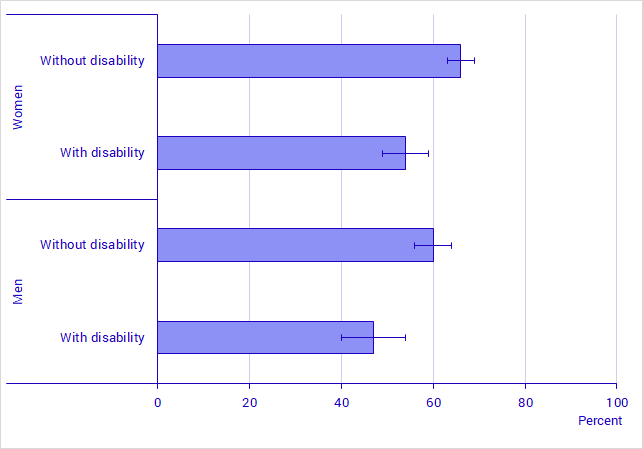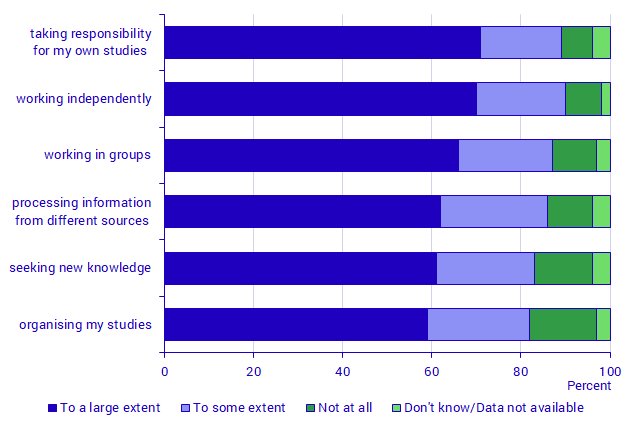Many women with a foreign background go on to higher education after folk high school
Statistical news from Statistics Sweden 2020-07-01 9.30
Six in ten participants in the folk high school general course who acquired general entry qualifications to higher education studied in higher education at some time. With regard to persons with a foreign background in this group, 75 percent of the women and 60 percent of the men continued to higher education studies.
A new Statistical Report from Statistics Sweden, “Follow-up of the general course at folk high school”, describes the study situation at the general course and participants’ activities after completing the course. The report is based on a questionnaire survey carried out in spring 2020 addressed to participants who acquired general entry qualifications to higher education 1.5-2.5 years earlier.
An important objective of folk high schools is to offer education that works well for participants with disabilities. Among the responding participants, 30 percent had a disability. Around half of them went on to further study, which is a lower proportion than among participants without a disability.

Many feel that they received an adequate foundation for higher education studies
Barely two in three participants who studied in higher education considered that they acquired the skills needed for studies in higher education via their folk high school education. Women were slightly more positive than men. There were no differences between participants with or without disability. In addition, there were no differences between participants with a Swedish and a foreign background.
With regard to transversal skills, the participants felt that the best skills they acquired at folk high school for use in higher education was taking responsibility for your own studies and working independently.

There are some tendencies, but on the whole, the differences between the various groups of participants are minor. Women with a foreign background were somewhat more positive, while men with a Swedish background and men with a disability were somewhat more negative in their assessment.
Participants satisfied with their folk high school education
Most of the participants were satisfied with their education. Two in three participants were even very satisfied. The most positive assessment was with regard to the treatment by the teachers, which three in four participants were very satisfied with.
Higher education studies most common activity in early spring 2020
Among those who acquired general entry qualifications for further study in the academic years 2016/17-2017/18, around 40 percent were studying in higher education in early spring 2020. This percentage was slightly higher among women than among men. Around one-third had work as their main activity.
The broader mission of folk high schools
Folk high schools have several objectives in addition to helping bridge educational gaps and raising the level of education and cultural awareness in society. For this reason, the survey also asks for the participants’ view on certain aspects of the objectives of folk high school, such as folk high schools’ aim to strengthen and develop democracy and help make it possible for an increased diversity of people to influence their life situation and create participative involvement in societal development. Read more in the report Graduate tracking of folk high school students
Definitions and explanations
General course at folk high schools
The general course at folk high schools is mainly oriented towards persons who did not complete compulsory or upper secondary school and it gives qualifications for further study corresponding to the qualifications acquired in upper secondary school or municipal adult education. Studies at upper secondary level can lead to general entry qualifications for vocational higher education or higher education.
Questionnaire survey
Participants who completed the general course at folk high school in the academic years 2016/17-2017/18 received, in January 2020, a questionnaire with questions about their activity after completing the general course and their views on their studies at folk high school.
The results are based on a questionnaire survey carried out among around 9 000 participants in the folk high school general course. The response rate was 40 percent among the participants with general entry qualifications and 25 percent among participants without general entry qualifications to vocational higher education or higher education. The results have been recalculated, using statistical methods, so that the figures refer to all participants and not just the respondents.
Publication
Next publishing will be
Register data: 2021
Questionnaire survey: 2030
Feel free to use the facts from this statistical news but remember to state Source: Statistics Sweden.
